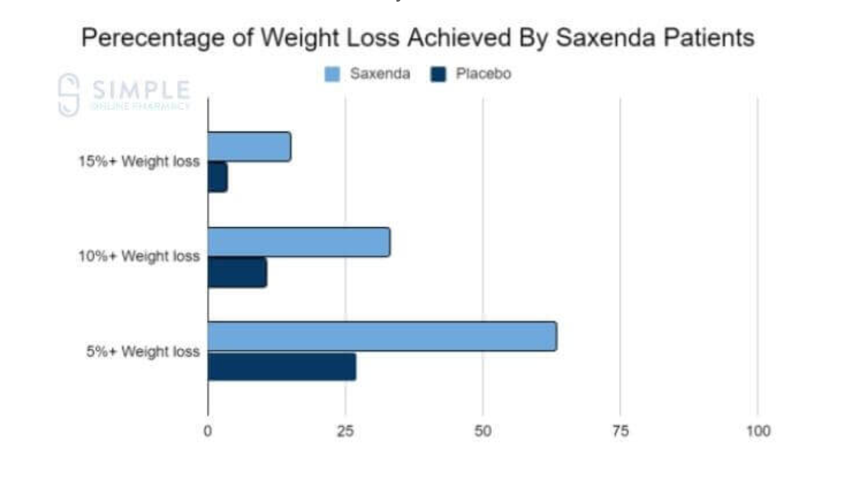Medication for Obesity: Ozempic (Semaglutide) Injection

Obesity is a chronic disease that has become a global problem.1. Obesity is not just a problem related to the person's appearance; It is also known that it can cause problems such as insulin resistance, hypertension and high cholesterol.2. In addition, a one-to-one relationship between obesity and type 2 diabetes, cardiovascular diseases and fatty liver has been observed. Obesity, which can cause all these problems, can naturally reduce a person's quality of life and life expectancy.3. In fact, we have seen once again in our recent history with Covid-19 that complications from obesity are not limited to this, and that they can be associated with many other diseases. People with obesity problems have both more severe Covid-19 disease and higher mortality rates in this group.4shows that obesity actually negatively affects the health status of people in general and increases their exposure to diseases more.
Adopting a healthy lifestyle is the most important measure in the fight against obesity. It is very important to direct the person to healthier foods, to increase the amount of activity and to take the necessary steps in line with health checks. Of course, it is also unrealistic to be able to do all this at once and expect a person to change their whole life within 24 hours. It is always best for patients to set small goals and magnify them reasonably as they reach small goals. For example, it may not be a realistic and sustainable goal to enroll a person who has never exercised in his life to do sports 5 days a week by signing up for the gym. Instead, it would be a better option to start with short 10-minute walks a day.
Although we make a change in our lifestyle, maintaining appetite control is the most difficult step. Even if we do sports and turn to healthier foods, it is only possible to reduce the amount of portions we eat with appetite control. Although the portion amounts are reduced by dieting, the sustainability of the diets and the permanence of the weight lost during the diet can be short-term after the appetite does not decrease.
Ozempic (semaglutide) is a drug that has been recently approved by the American food and drug administration (FDA) for weight loss. This drug, which was first released for the treatment of type 2 diabetes and insulin resistance, provided a significant weight loss in patients using it, after a while, studies were conducted on the suitability of its use only for weight loss, and as a result of not observing any serious long-term side effects on human subjects, it was approved for only weight loss.
Ozempic is a glucagon-like peptide-1 (GLP-1) analogue5. GLP-1 is a natural hormone that has important roles in appetite control and glucose metabolism. Blood sugar and appetite interact with changes between the pancreas and the brain. GLP-1 has a very important role in this interaction.
In cases where blood sugar is high, GLP-1, which triggers the necessary insulin secretion, does not have an effect in cases where blood sugar is not high. That is, the blood sugar in the body must be high for it to trigger the release of insulin. In this way, it does not allow the person to enter a state of hypoglycemia. In addition, it reduces the release of insulin in cases of low blood sugar, allowing the body to recover more easily.
GLP-1 also helps prevent high blood sugar levels by reducing glucagon secretion. Since the decrease in high blood sugar will also delay the passage of the food that will pass from the stomach to the intestine, it ensures that the feeling of fullness exists for a longer period of time. In this way, it triggers weight loss and a decrease in body fat, along with a decrease in appetite and a decrease in the amount of food eaten.
One of the effects of Ozempic is to develop an aversion to foods high in fat. In all studies, a significant decrease has been observed in the consumption of ready-made and high-fat foods that a person craves in normal times.
Geniş katılımlı klinik çalışmalarda, haftada bir kullanılan ozempic enjeksiyonu ile kişilerin %86’sının kilo verme konusunda başarılı oldukları ve verilen kilonun da ortalama olarak vücut ağırlığının %14.9’u kadar olduğu gözlemlenmiştir5. Step 1, yani ilk çalışma sonucu olarak ortaya çıkan bu rakam, ilaç onaylandıktan sonra gelen kullanım izni ile birlikte artan hasta sayısı ile daha net şekillenmeye başlamıştır. Örneğin, son verilen rakamlara göre, ozempic kullanılan hastaların %32’sinde, vücut ağırlığının %20’sinin üzerinde bir kilo verimi gözlemlenmiştir6. In short, the amount of weight to be lost can vary from person to person. But the benefits are not limited to weight loss only.
Ozempic ile tedavi edilen hastalarda kalp krizi ve felç gibi kardiyovasküler olayların yaşanma ihtimalinin de %26 oranında azaldığı gözlemlenmiştir6. With weight and fat loss, repair of insulin resistance, regulation of cholesterol level, and normalization of blood pressure can be observed, and it is seen that these contribute positively to the health of the person in general.
To Whom Can Ozempic Be Applied?
Ozempic, which can be applied to people with type 2 diabetes or insulin resistance problems, is also applied to people who do not have such complaints but have chronic weight problems. In June 2021, Ozempic was approved by the FDA for weight loss only. In this way, people who have obesity problems and therefore are exposed to health problems can now lose weight by using ozempic.
Who Should Not Be Applied to Ozempic?
Ozempic should not be used in people with MEN2 syndrome and in people with a family history of Medullary thyroid carcinoma (MTC). No risk has been reported for Papillary, Follicular and Anaplastic thyroid cancers. However, people with a family history of such cancers and active thyroid nodules should not use Ozempic.
What is the Difference Between Ozempic (Wegovy) and Saxenda?
İki ilaç da teknik olarak benzer bir mekanizma ile çalışır. İki ilacın da amacı iştah kontrolü sağlamak, porsiyonları küçültmek ve kilo verimini sağlamaktır. Yine de iki ilaç arasında bazı farklılıklar mevcuttur. En temel fark, Saxenda günlük olarak yapılan bir enjeksiyonken, Ozempic haftada bir yapılan bir enjeksiyondur. Yapılan en kapsamlı mukayeseli klinik çalışmada, 26 hafta sonunda Ozempic kullanan hastaların ortalama olarak başlangıç kilolarının %13.8’i kadar bir kilo verdikleri, Saxenda kullanan hastalarda ise bu rakamın %8’de kaldığı tespit edilmiştir7. In addition, a higher incidence of side effects has been reported in patients using Saxenda. As the reason, there are thoughts that side effects may develop depending on the frequency of use because Saxenda is applied every day.


What is the Difference Between Ozempic and Trulicity?
Both injections are administered once a week. The biggest difference between these two preparations, which are similar in this respect, is that Trulicity is not FDA approved. In addition, in clinical studies, it was observed that people using Ozempic lost 2 times more weight than people using Trulicity and had a similarly better decrease in HbA1C rates.
What Are the Possible Side Effects of Ozempic?
The most reported side effects during the use of Ozempic are limited to stomach and intestinal problems. These are mainly:
- Nausea
- Stomache ache
- feeling of indigestion
- Diarrhea
- Constipation
- Weakness
These effects usually follow a mild to moderate course. It is observed that such side effects decrease as the drug use exceeds a few weeks. Side effects related to the stomach and intestines are generally related to the prolongation of the gastrointestinal transit time of foods.
Although there is no such finding in studies related to Ozempic, it has been reported that acute pancreatitis and biliary stone formation are rarely seen in GLP-1 analogues. Therefore, if you experience problems such as stomach pain, yellowing of the skin or whites of the eyes, and lightening of the stool color, you should consult your doctor and review the use of medication. At the same time, tests and examinations will be required at certain periods during drug use.
Again, although no such case was found in any human study with Ozempic, the possibility of thyroid tumor was reported in mouse experiments. Although unlikely, it is important to control your thyroid functions before and after taking medication.
How Much Weight Will I Lose With Ozempic?
In both studies and Dr. It is possible to present a table as follows in line with the data obtained from the treatments that Ahmet Özyiğit has applied to date:
Hastaların %13’ü ilk 1 ay içerisinde 1-4 kg arası kilo vermiştir.
Hastaların %66’sı ilk 1 ay içerisinde 5-7 kg arası kilo vermiştir.
Hastaların %17’si ilk 1 ay içerisinde 8-11 kg arası kilo vermiştir.
%4 of the patients lost more than 12 kg in the first month.
Is there a test to be done before starting treatment?
Before treatment, certain parameters must be checked. The reason for this is to see if there is another metabolic problem underlying the weight problem and to have information about the cardiovascular risks and general health of the person. The tests to be requested before the treatment are as follows:
- CBC
- ALT, AST, GGT, Amylase
- Iron, Ferritin, TIBC
- Urea, Creatinine
- FAC, insulin, Homa-IR, HbA1C
- TSH, fT4
- Total cholesterol, HDL, LDL, Triglyceride
- Vit D, Vit B12, Folic acid
- CEA, CA 19-9
It is also very important for people with a family history of thyroid cancer to have a thyroid ultrasound and to undergo periodic controls.
References:
1. Garvey, W., Mechanick, J., Brett, E., Garber, A., Hurley, D., & Jastreboff, A. et al. (2016). American Association of Clinical Endocrinologists and American College of Endocrinology Comprehensive Clinical Practice Guidelines For Medical Care of Patients with Obesity. Endocrine Practice, 22, 1-203. doi: 10.4158/ep161365.gl
2. Neeland, I., Poirier, P., & Després, J. (2018). Cardiovascular and Metabolic Heterogeneity of Obesity. Circulation, 137(13), 1391-1406. doi: 10.1161/circulationaha.117.029617
3. Whitlock, G., Lewington, S., & Sherliker, P. (2009). Body-mass index and cause-specific mortality in 900 000 adults: collaborative analyzes of 57 prospective studies. The Lancet, 373(9669), 1083-1096. doi: 10.1016/s0140-6736(09)60318-4
4. Sanchis-Gomar, F., Lavie, C., Mehra, M., Henry, B., & Lippi, G. (2020). Obesity and Outcomes in COVID-19: When an Epidemic and Pandemic Collide. Mayo Clinic Proceedings, 95(7), 1445-1453. doi: 10.1016/j.mayocp.2020.05.006
5. Wilding, J., Batterham, R., Calanna, S., Davies, M., Van Gaal, L., & Lingvay, I. et al. (2021). Once-Weekly Semaglutide in Adults with Overweight or Obesity. New England Journal of Medicine, 384(11), 989-1002. doi: 10.1056/nejmoa2032183
6. Schaffer, R. (2022). Weekly semaglutide injection associated with substantial weight loss in obesity. Retrieved 15 June 2022, from https://www.healio.com/news/endocrinology/20210211/weekly-semagltide-injection-associated-with-substantial-weight-loss-in-obesity
7. O'Neil, P., Birkenfeld, A., McGowan, B., Mosenzon, O., Pedersen, S., & Wharton, S. et al. (2018). Efficacy and safety of semaglutide compared with liraglutide and placebo for weight loss in patients with obesity: a randomised, double-blind, placebo and active controlled, dose-ranging, phase 2 trial. The Lancet, 392(10148), 637-649. doi: 10.1016/s0140-6736(18)31773-2
Dr. Ahmet Ozyigit, MD, MSc (Clinical Embryology), PgDip (Endocrinology)
Clinical Coordinator and Clinical Lead for Research – Elite Hospital
Clinical Skills Tutor – University of Nicosia Medical School
Additional Links:
Dr. Ahmet Özyiğit – Wellness and Anti-aging Applications Website
How Does Semaglutide Treatment Help You Lose Weight?
Contact Us For Appointment:
Telephone line: 0392 444 3548 (ELIT)
Contact Form: https://www.elitenicosia.com/iletisim/

















